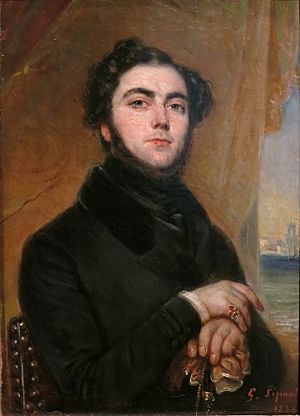Eugène Sue facts for kids
Quick facts for kids
Eugène Sue
|
|
|---|---|

Portrait of Sue in 1835, by François-Gabriel Lépaulle
|
|
| Born | Joseph Marie Eugène Sue 26 January 1804 Paris, France |
| Died | 3 August 1857 (aged 53) Annecy-le-Vieux, Kingdom of Sardinia |
| Resting place | Cimetière de Loverchy, Annecy |
| Occupation | Novelist |
| Education | Lycée Condorcet |
| Period | 1830–1857 |
| Literary movement | Romanticism |
| Notable works | The Mysteries of Paris, The Wandering Jew |
| Notable awards | Legion of Honour |
Marie-Joseph "Eugène" Sue (born January 26, 1804 – died August 3, 1857) was a famous French novelist. He was one of the writers who made serial novels very popular in France. A serial novel is a story published in parts, often in a newspaper or magazine, over a period of time. His most famous work, The Mysteries of Paris, was published this way from 1842 to 1843 and became incredibly popular.
Contents
Early Life and Adventures
Eugène Sue was born in Paris, France. His father, Jean-Joseph Sue, was a respected surgeon in Napoleon's army. Even Empress Joséphine was Eugène Sue's godmother!
Eugène Sue himself trained as a surgeon. He worked as a surgeon during a French military campaign in Spain in 1823. He also served at the Battle of Navarino in 1827, which was a big naval battle. In 1829, his father passed away, and Eugène inherited a lot of money. This allowed him to settle down in Paris.
Writing Career
Eugène Sue's experiences at sea gave him many ideas for his first novels. These included Kernock le pirate (1830) and Atar-Gull (1831). He wrote these books during the exciting Romantic movement of the 1830s, which focused on strong emotions and imagination.
He also wrote historical novels like Jean Cavalier (1840). In his novel Mathilde (1841), he used a famous saying for the first time: "Revenge is very good eaten cold." This means that revenge is best when it's planned carefully and taken later, not in the heat of the moment.
Famous Serial Novels
Eugène Sue was greatly influenced by the idea of socialism, which is about creating a fairer society. These ideas inspired his most famous works:
- The Mysteries of Paris (Les Mystères de Paris)
- The Wandering Jew (Le Juif errant)
These novels were published in newspapers as serials, meaning they came out in small parts over many months. People eagerly waited for the next part of the story!
The Mysteries of Paris showed the difficult lives of poor people and the secrets of the rich. It became so popular that it led to many similar "city mysteries" books around the world. The Wandering Jew was a thrilling story with a mysterious main character and a villain who was a Jesuit (a member of a Catholic religious order).
Sue's books were sometimes controversial. They had intense scenes and also shared his ideas about society and his critical views on certain religious groups.
Other Works
He continued to write many other long books. Les Sept pêchés capitaux (1847–1849) had stories about each of the seven deadly sins.
Another huge series was Les Mystères du peuple (1849–1856). This was a long collection of historical novels about French history. It started with stories about slavery in the Roman Empire and went through different periods, including the Crusades and the French Revolution. The government tried to stop its publication in 1857 because of its content.
Some of Sue's books, like The Wandering Jew and The Mysteries of Paris, were even turned into plays. He was very successful and popular at the same time as another famous writer, Alexandre Dumas.
Political Life
After the French Revolution of 1848, Eugène Sue became involved in politics. He was elected to the Legislative Assembly (a type of parliament) for Paris in 1850.
However, he was forced to leave Paris in 1851. This happened because he spoke out against a coup d'état (when a small group suddenly takes control of the government). Being exiled actually made him write even more! Eugène Sue passed away in Annecy-le-Vieux, Savoy, on August 3, 1857. He was buried in Annecy.
Legacy
- There is a street named Rue Eugène Sue in Paris, France.
- There is also a street named Calle Eugenio Sue in Mexico City.
- The American socialist leader Eugene Victor Debs was named after Eugène Sue and Victor Hugo.
- In a novel by Thomas Pynchon, an intelligent dog named Pugnax enjoys reading Sue's books.
See also
 In Spanish: Eugène Sue para niños
In Spanish: Eugène Sue para niños
 | Mary Eliza Mahoney |
 | Susie King Taylor |
 | Ida Gray |
 | Eliza Ann Grier |

